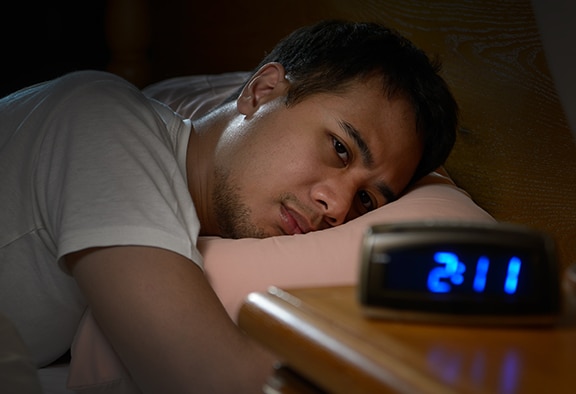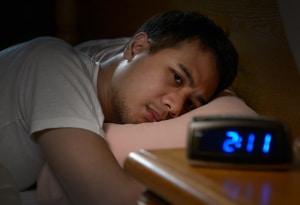
It’s no overstatement to say that diabetes can have a significant impact on your overall health. If you’ve been diagnosed with this condition, you’ll need to change your diet and set up an exercise routine to keep it under control. Otherwise, you’ll be at risk of short-term symptoms like extreme hunger and thirst and frequent urination. That’s not even mentioning long-term complications such as heart disease, nerve damage, and vision problems.
These effects of diabetes are relatively well-known, but you might not know that diabetes can affect the quality of your sleep. Whether you tossed and turned through the night or slept like a baby before your diabetes diagnosis, keep reading for crucial info on diabetes and sleep.
The Link Between Diabetes and Sleep

We’ve known that diabetes can impact people’s sleep for at least a decade now. In 2012, a research team looked into connections between sleep disturbances (including difficulties falling asleep, trouble staying asleep, and oversleeping) and diabetes. Their research found a clear link between the two and made it clear that sleep deprivation can be a diabetes risk factor.
Even if you have diabetes, your sleep may or may not be affected by the disease. That’s because the impact diabetes can have on rest is tied to symptoms that not everyone experiences. These symptoms are more likely to affect your rest:
- People with high blood sugar levels may need to urinate more frequently than usual. As a result, they might have to wake up to go to the bathroom during the night.
- Excess blood glucose can drain water from your tissues. That can make you dehydrated, meaning you might need to get up and get a glass of water late at night.
- Low blood sugar symptoms can affect your sleep, too. These symptoms include sweating, shaking, and dizziness.
Sleep Disorders in People with Diabetes
In addition to the impact these symptoms can have on your sleep schedule, certain sleep disorders are seen more commonly in people with diabetes. These include:
Sleep Apnea
When you have sleep apnea, your breathing repeatedly stops and starts multiple times per night. This is the most common sleep disorder for people with diabetes – particularly type 2 diabetes, as it can be exacerbated by excess weight.
Symptoms of sleep apnea include snoring and daytime sleepiness. Common risk factors are obesity and a family history of sleep apnea. To manage this condition, you may need to use a CPAP (a special mask) and weight loss can help, as well.
Restless Leg Syndrome
As its name suggests, the defining trait of restless leg syndrome (RLS) is a relentless need to move your legs. Since it’s most common during the night, it can make falling asleep or staying asleep difficult.
Things like high blood glucose levels, thyroid disorders, and kidney problems can increase your RLS risk. It has been found that tobacco use or iron deficiency can also trigger the syndrome. If you think you might have RLS, let your healthcare team know.
Insomnia
If you have a rough time falling or staying asleep, there’s a good chance you have insomnia. High levels of glucose and stress can increase your likelihood of experiencing this condition.
To treat insomnia, start by considering sources of stress in your life and working from there. Professional medical advice can help you deal with insomnia, as well.
Improve Your Sleep with These Tips

While diabetes can affect your sleep, poor sleep can also make it more challenging to manage this disease. Not getting enough rest can affect your hormones and can increase the likelihood that you’ll overeat to gain energy. That can cause you to gain weight, making diabetes management more complicated – and potentially making your sleep problems even worse.
To avoid this vicious circle, you’ll need to do what you can to improve your sleep habits. A few simple steps can help:
- Make an environment where it’s easy to sleep. If you haven’t bought a new mattress lately, it might be time for an upgrade. Along with that, keep your bedroom at a relatively cool temperature.
- Don’t do anything stimulating before bed. That can include exercise, caffeinated drinks, and even basic housework. If you have to exercise at night, consider a slow yoga routine.
- Set a sleep schedule and stick to it. By following this schedule all week long (including weekends), you’ll essentially train yourself to get tired when you need to sleep. Also, it is recommended to not take naps after 3 pm and for no longer than 20 minutes.
- Consider using white noise. If outdoor noises can wake you up easily, white noise may help you tune them out. You can generate white noise by turning on a fan or downloading a white noise app for your smart device.
- Cut out digital distractions. Texting and web browsing before bed can keep your mind active long after you put your phone down. Along with that, the glow from screens may wake you up. If you have to read something before bed, make sure it’s in a paper book or on an e-reader with an unlit e-ink screen.
- Don’t drink before bed. Even if alcohol helps you unwind, it may wake you up in the middle of the night.
- Monitor your blood sugar closely. By controlling your blood glucose levels, you’ll reduce diabetes symptoms and their effects on your sleep patterns. To do this, you’ll need a reliable glucose meter and other diabetes testing supplies. You can purchase all these items and more from ADS!
